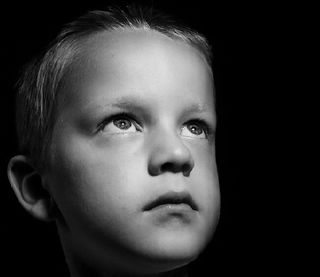Depression
The Roots of Early-Childhood Depression
An unmistakable predictor of adult depression.
Posted August 14, 2019 Reviewed by Hara Estroff Marano

I recently heard Joan Luby, a child psychiatrist from Washington University in St. Louis, discuss early childhood depression. Although not listed in the DSM, the symptoms are similar to depression in general, such as hopelessness, low self-esteem, and low energy. But what’s noteworthy is that Luby found these symptoms present in preschoolers from age 3 to 6.
How is it possible, we might ask, for children as young as 3 or 4 to be depressed? Could it be due to genetics? Luby sees epigenetics, the effect of early environment on genes, as a more plausible possibility. Then, must it be due to poverty? Again, although poverty and deprivation have been proven to be causal factors for over two decades, Luby also found early childhood depression among middle and upper income families. The culprit, she believes, is the early relationship, support, warmth, and reassurance that a toddler receives from his or her mother.
According to Luby, the interaction between the mother and the infant/toddler determines the child’s later neurodevelopment. For instance, longitudinal studies from 2002 found that the hippocampus of those with symptoms of depression had less volume and lower cortical volume as young adults, influencing their psychosocial interactions, emotional regulation, and cognitive function.
Luby sees early -hildhood depression as an unmistakable predictor of adult depression, including Major Depression Disorder. At her clinic, she provides a variation of Parent-Child Interaction Therapy-Emotional Development (PCIT-ED). A filmed example depicts a therapist sitting on one side of a glass partition, observing and coaching a mother how to provide comfort for her child’s extreme frustration over being unable to grab a hanging desirable object manipulated by the therapist.
The visible symptoms of early childhood depression are intense irritability, negative affect, anhedonia (an inability to enjoy things), not participating in play, and indifference to behavioral rewards. Comorbidity rates run at about 45 percent with attention-deficit/Hyperactivity disorder (ADHD), oppositional defiant Disorder (ODD), and conduct disorder (CD).
A key issue in the assessment of internalized disorders in young children, particularly depression, is that caregivers may fail to spontaneously report symptoms (changes in play, social interest, sleep, and so on) or may unwittingly accommodate these behaviors and thereby fail to regard them as symptoms (e.g., anxious rituals, rigidities, and social withdrawal).
Intense irritability and disruptive behavior are probably the most common symptoms that prompt parents and primary-grade teachers to refer a young child to undergo a mental health evaluation. While irritability is nonspecific and may be a symptom of a variety of early childhood disorders, when it presents along with social withdrawal and anhedonia and/or excessive guilt, early depression should be considered.
Identification of preschool depression in the clinical setting remains challenging. Common symptoms such as irritability and even sadness, when present without other depressive symptoms, are relatively nonspecific markers and cannot be used to differentiate preschool depression from other disorders. Further work is needed to educate parents and primary-care physicians about early signs and symptoms of depression in young children.
Adding to the confusion are the high rates of comorbidity with other, more commonly-occurring behavioral disorders, such as ADHD and oppositional defiant disorder. These disorders are characterized by disruptive symptoms and are more readily apparent, increasing the risk that such symptoms will overshadow co-occurring depression.
If Luby’s thesis holds, there will be a lot of catch-up to do—training preschool and daycare staff, primary grade teachers, school counselors, parents, and caregivers, as well as DSM recognition and application of criteria for reliable and valid diagnoses.
I see Luby’s research as a possible major breakthrough pointing the way to better understanding and prevention of depression. However, there is the possibility that the etiology is more likely to be congenital rather than a lack of maternal warmth and support.
This post was co-published with PsychResilience.com




